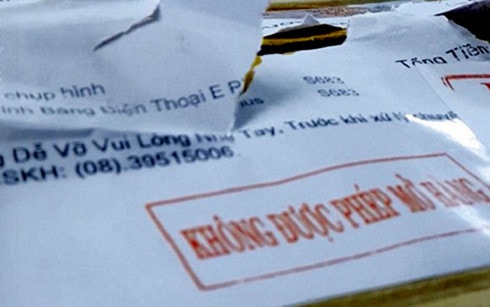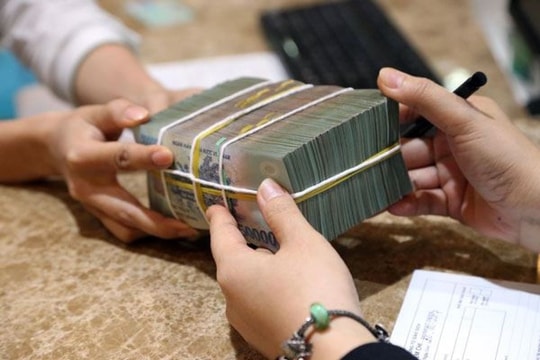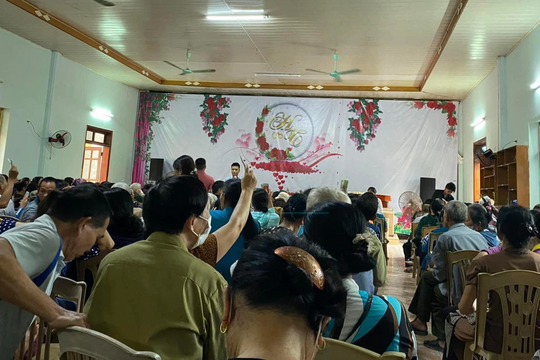Buying by phone and spectacular scams
With ambiguous information over the phone, many buyers were blatantly deceived when the products received were not as expected.
Recently, Ms. Tien (Hoang Mai district, Hanoi) received a phone call from an unknown number. The caller introduced himself as an employee of MH Company and said that Ms. Tien was one of the few lucky customers who won a voucher worth 5 million VND in the company's gratitude program on the occasion of its 5th anniversary.
 |
| Products are delivered by post using the “cash on delivery” method, making it difficult for consumers to check. (Illustration: KT) |
The company staff suggested that this voucher could be used to buy a Samsung Galaxy A8 phone worth over 5.5 million VND. With 5 million VND already in the voucher, Ms. Tien only had to pay the remaining amount of over 3.5 million VND.
Faced with the attractive offer and knowing the value of this phone on the market, Ms. Tien accepted the transaction with MH Company. However, after paying 3.5 million VND and receiving the goods, Ms. Tien discovered that the product she received was a MIQ A8 phone with a value of only about 1 million VND.
Ms. Tien immediately reported that the product received was different from the initial information, but MH Company refused to exchange or refund the goods, nor did it acknowledge the advertised content, claiming that Ms. Tien had misheard the information on the phone...
The case of Ms. Tien as mentioned above is just one of many incidents that have occurred recently related to the form of promotion and purchasing goods by phone. According to the Competition Management Department (Ministry of Industry and Trade), this agency has received a large number of complaints from consumers about being "cheated" when purchasing goods by phone.
According to the Competition Management Department, most of these cases have some notable common features, that is, the scammers often notify consumers by phone that they have won a promotional voucher, then encourage and persuade consumers to use that voucher to buy products from large, high-value brands.
It is worth noting that during the introduction process, the person claiming to be a "company employee" will intentionally provide information to confuse consumers and make them think that they will be able to buy a product from a reputable brand at a very low price because they are enjoying incentives and promotions from the company...
Products are delivered by post using the “cash on delivery” (COD) method with the condition that the goods can only be opened and viewed after payment has been made. Thus, consumers will not have the opportunity to check the products and will usually only realize they have been “cheated” after paying and receiving the goods.
In this delivery method, the delivery service provider himself is not a “company employee”, so consumers cannot directly complain or reflect even in the case of discovering a discrepancy upon receiving the goods.
Even though they do not agree with the product they received, when consumers complain and request a refund, the company often gives the reason that consumers misunderstood the "consultant's" intention. They claim that the "company employee" said that consumers can buy a phone "using technology" of Samsung Galaxy A8, not "Samsung Galaxy A8 phone"... This is a difficult thing for consumers because the consultations and exchanges made over the phone were not recorded or saved in any format.
Given the above reality, to protect the legitimate rights and interests of consumers related to similar transactions (remote purchases, purchases on television, purchases by phone, etc.), the Competition Management Department recommends: When consumers receive notification of winning prizes and offers to buy products from any company, they need to find out clearly the information about that company. It is necessary to limit transactions with companies that have no information or bad information about transaction history, etc.
For products offered for sale at a discount, consumers need to research and compare, check, and be suspicious when they see a large difference between the selling price and the value of the goods, or a large difference between the advertised selling price and the market price of the same or equivalent goods.
To optimize and avoid similar situations, consumers need to keep evidence related to transactions such as recording conversations or requesting "company employees" to send information about transactions such as product names and images, prices, transaction conditions, etc. At the same time, quickly contact state management agencies and social organizations involved in protecting consumer rights when their legitimate rights and interests are violated.
According to VOV







